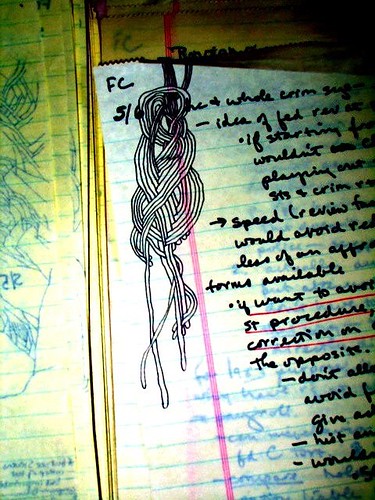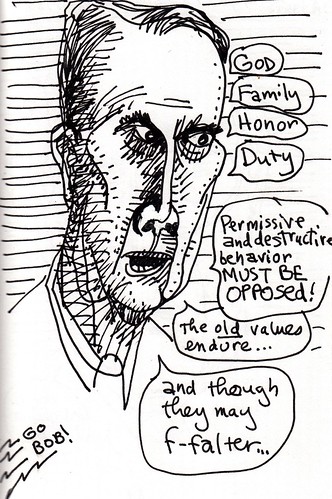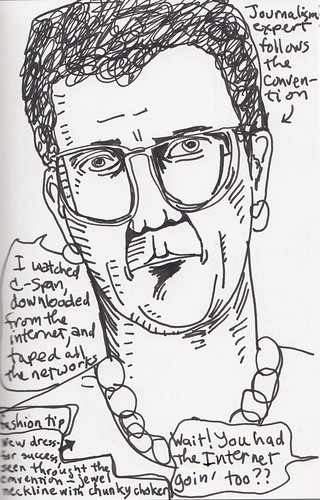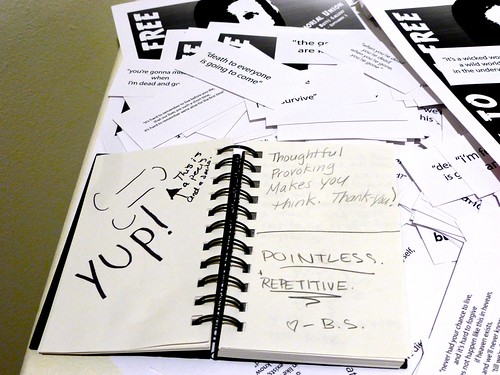The law faculty here is having an email list debate about the perceived problem of students using the wireless internet access during class to check websites, do email, IM, etc. Blogging hasn't been mentioned yet, but presumably, where there is wireless access, there is blogging. Some faculty don't like the idea that students aren't paying full attention. That has always been the case of course -- who pays full attention to a lecture? Personally, I find doing something like playing a simple video game or doodling helps me pay more attention to a lecture. There is nothing that special about wireless access when it comes to this complaint. I consider the inability to lock onto a speech and pay 100% attention to be part of what is, in all, a positive human capacity: we retain our independent thoughts and desires and do not achieve oneness with a person who is talking at us.
But there is a more specific problem: the way computer screens distract other students. How much of a distraction is a computer screen? I know when I was a law student, I chose to sit in the front row because I found the backs of people's heads distracting. There are always distractions. In fact, it's funny how distracting the least interesting things are when you're at a lecture. Suddenly, you want to watch someone take a sip of coffee or sharpen a pencil. This is human nature, part of our connection to the concrete world. We want to see things, feel things. This is
good.
Do students really mind the images on the other computers? If you glance around and can see which blog someone else is reading or that the Drudge Report has put up the revolving siren image, can't you deal with that? If you find it especially hard, choose a front row seat.
Now, somebody in the faculty email discussion said that some students have complained that other students look at
pornographic images during class. I was surprised to hear that, because what student would be so disrespectful of other students and so unconcerned about being disliked? Is that really happening? That is so out of line with basic social etiquette that I find it hard to believe. But if it is, can't the
students apply some peer pressure to these social outliers? IM the clod.
Anyway, send me some email, law students, and tell me if I'm not taking the problem seriously enough. On the faculty email list, I offered a proposal that there should just be a clear rule against displaying any images on screen during class. You can have all the text you want, but no images. But really, I'm inclined to think the whole thing is just not a real problem.
UPDATE: You know, it wasn't that long ago that people thought the students shouldn't be
typing on laptops during class, because that was too distracting. In the early days of laptops, some students had laptops that they kept in their backpacks during class. They thought it would be offensive to use them to take notes. Now, no one thinks of that as a distraction.
ANOTHER UPDATE: My colleague Gordon Smith
offers his thoughts on the subject. My son John, a first year law student, writes:
I don't think the school should have rules dealing with distracting images (unless, of course, they're offensive images). I sometimes let my screen saver (a slideshow of photos) turn on in class. It's possible that another student could start looking at my photos and stop listening to the prof. But I just don't feel that that would be MY responsibility!
Note that distracting images are nowhere near as bad as distracting noises. You can't just close your ears to certain noise, whereas you can choose not to look right at someone's computer screen. And you NEED to HEAR the prof; you don't need to SEE the prof.
If it's a problem for students to display distracting images on their computer screens, then shouldn't students also be prohibited from wearing flashy clothing?
My property prof is always putting up extraneous images on her PowerPoint slides, e.g. while she's discussing a case about marriage she'll put up a photo of a random married couple that she got off the web. Should SHE be forbidden from showing distracting Internet images?!
Law profs shouldn't deal with the problem of "not paying attention" by coming up with regulations; they should deal with the problem by making their classes more interesting!
But wireless access should be blocked in the classrooms (as it is at Cornell), because it destroys the Socratic method to let students IM and email answers to each other in class.
A Yale undergraduate who is planning to go to law school wrote this:
I personally don't bring my laptop to class -- I like writing down my notes, because I type quickly enough that if I typed notes I would just transcribe the lecture and glean nothing from it, and I think it is a valuable skill to discern on the spot what information is important or not -- but a ton of my friends do. And of course there is rampant IMing, emailing, surfing (not porn sites though...what total creep looks at porn in class?!) but I wanted to mention to you something that professors might not think about, which is students using the internet in to look up additional information on the topic at hand.
I've seen this happen plenty of times. The professor brings up a new topic, or mentions a particularly interesting anecdote, and students start Googling away to find out more. If that isn't a sign of the intellectual curiousity that we as college students are always encouraged to have, I don't know what is.
On a sidenote, I don't find laptops particularly distracting, unless the lecture is poorly delivered enough to warrant my desire to FIND distractions. And if that's the case, I will find distractions anywhere -- typically in the crossword puzzle, which is something that just cries out for collaborative whispering and note passing among students. Oh, the horror!! Ban the crossword!!
A law student writes:
I LOVE it. I am like you, in that I can't really pay 100% attention, and in my undergrad, I'd just doodle. This way, I am doing productive things like reading your blog, catching up on the news, doing assignments for other classes and work, talking to my wife at home on the home computer, etc. Not only that, but when I am really interested in something the teacher says, I'll go to Lexis and pull up the case, or do a quick search on Google and find that his facts are all wrong and therefore, so is his argument. More than a few times, a friend has been called on, and been way off, but with a little helpful IM, he's back on track. Wireless is a beautiful thing, and would only help the students. Like you say, those who won't pay attention, wouldn't pay attention anyway. Moreover, I've found that my attention span is about the same as it was before. If class is interesting, I'll pay attention.
As for being a distraction, the way our classrooms are set up, you can see what website someone is on, but you can't read it (too small font), so it isn't a temptation. I've never seen porn during class, and I sit closer to the back in each class. I have seen at one time, approximately 95% of the laptop users in class (which at any time is between 60 and 90%) playing solitaire during one particular dry lecture.
YET ANOTHER UPDATE: This is very interesting, from a fairly recent graduate of NYU School of Law [ADDED: it's Matt Marcotte of
Throwing Things]:
[D]uring my law school time …, Internet misuse during class was rampant -- online gambling, day trading, checking the news, etc.
Honestly, I never found it that distracting, and it's basically unregulable without doing a complete ban on Internet use, which I think is a bad idea--having Internet access allows access to a wide range of information and commentary which (when used well) can open up class discussion dramatically.
But a story on how broadband can be good--I was actually in class on September 11 in New York. At the time, I didn't have a broadband hookup capable laptop and sat near the back of the class. While the professor (who was apparently wholly oblivious -- not out of malice, but out of general obliviousness) prattled on, a student in the front row was constantly refreshing various Internet news sources on his browser and putting up the headlines on his screen so everyone behind him could read. (And yes, we heard the thud as the buildings collapsed in class, as the professor droned on.) So sometimes, "distraction" is a good thing.











